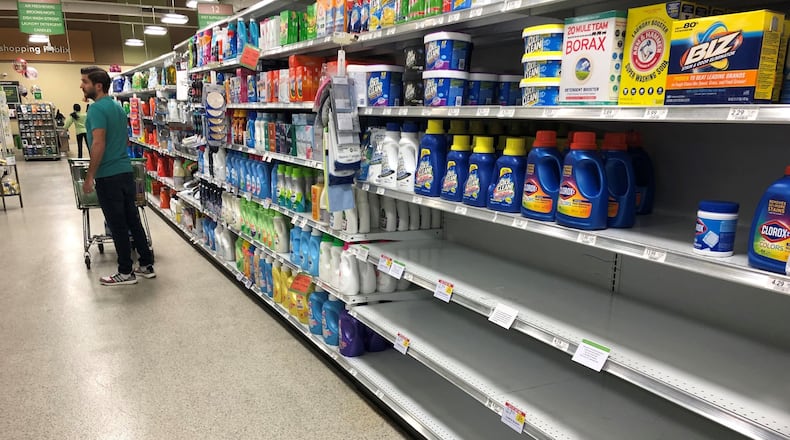Last week, as warnings and fears about the coronavirus ratcheted up, metro Atlanta shoppers flocked to grocery stores, filling carts to overflowing and standing in checkout lines that ran down aisles.
Tuesday night and Wednesday morning, shoppers didn’t find many lines. But they also didn’t find toilet paper, bleach, bread, eggs, rice and pasta, fresh meat, milk, antiseptic wipes and other items that people snapped up in quantity.
Like Baby Ruth candy bars, Donald Murphy said outside a Smyrna Publix.
“And they didn’t have Lance peanut butter crackers,” he added as he loaded eight plastic bags in his trunk.
Ten grocery stores visited between Toco Hills and Cobb County mostly had the same shortages. Still, there was plenty of food: piles of red apples, stacks of carrots and other fruits and vegetables, canned tomatoes, coffee, ice cream and store-roasted chickens.
Grocers from Sprouts to Costco are adjusting to Georgians’ pandemic-ignited buying habits. Supply chains are ramping up, and stores are adjusting hours and cleaning like crazy. Experts say there is plenty in the supply pipeline, but it is difficult for stores to keep up with demand because shoppers who used to buy a week’s worth of groceries are buying enough items for two weeks or more.
“Our stores continue to be extremely busy,” Maria Brous, communications director for Publix, said in an email. “Our warehousing and distribution centers are working around the clock to receive product from our suppliers and to ship product to our stores. Last week alone, we delivered almost 12,000 truckloads to our stores.”
Some customers can still be found lining up outside stores before opening. But trucks arrive at all hours of the day or night, so early arrivals don’t help their chances, store workers said.
And, when word gets around that some of the good stuff — like toilet paper and sanitizer — has come, hoard-buying still ensues. At a CVS in Ansley Park on Tuesday, there was a Black Friday-style line at the front door when the store opened, and people ran to grab the toilet paper and other items. The store was sold out again by 8:30 a.m. There have also been spot shortages of some items like Tylenol.
Tracey McCaine, who recently returned from New York, said shoppers seems more sane here than they were there. She was exiting an intown Whole Foods with two bags, including chicken, asparagus and four large bottles of water.
“I’m not going to be crazy about it,” she said. “How much hand sanitizer do you need?”
“People should be worried about detergent and being able to wash their clothes, but there’s still plenty of that.”
Suppliers are increasing production and delivery.
Eric Abercrombie, a spokesman for paper producer Georgia Pacific, said last week its mills shipped and distributed 120% of its normal load of paper towels, toilet paper and other tissues.
“Some were already running 24/7,” he said. But Georgia Pacific is looking to increase capacity and speed delivery.
Greg White, a logistics expert at Supply Chain Now in Atlanta, believes shortages will ease in two to four weeks.
“A lot of what I see is a lot of people hoarding goods. There’s a lot panic buying right now. As the hysteria and panic subsides, people will realize they have several weeks of food on their shelves,” he said.
Whole Foods announced that, beginning March 18, it would reserve its first hour of operation daily, from 7 a.m. to 8 a.m. for customers 60 and older. Target said it would do the same every Wednesday for seniors and other guests with underlying health problems.
Target, Whole Foods and Trader Joe’s have also limited store hours to give employees more time to clean and restock. Most of the companies’ changes can be found on their websites.
Jason Benson, an Atlanta web developer who was at a Midtown Trader Joe’s, said he grocery shops twice a week and will stick to the routine.
The gravity of the situation “didn’t really start to sink in until the weekend,” he said.
Hoarding is “ugly, stupid and unhelpful,” Benson said. “That instinct doesn’t make sense to me.”
Keep Reading
The Latest
Featured




